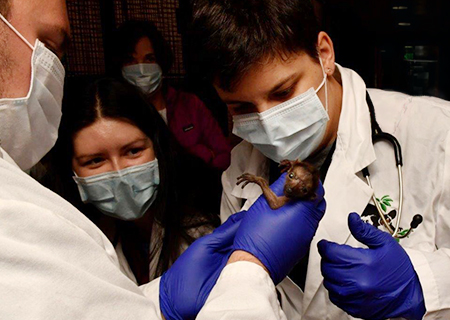“To say that the Veterinary Department was instrumental in the many changes at the Duke Lemur Center in 2020 would be a gross understatement. The decisions made by our two veterinarians to protect our staff and our remarkable colony of the world’s most endangered mammals were critical to our success.” – Greg Dye, Executive Director
Veterinary Care: 2020 Impact Report

DLC veterinarian Laura Ellsaesser and veterinary technician Cat Ostrowski examine a new infant during a routine wellness check.
In early 2020, when it became obvious that the COVID threat to the U.S. was imminent, the vet team evaluated the risk COVID-19 posed to our lemurs, guided decisions to keep our colony safe – including when to close the center to the public, and established strict protocols for wearing masks in animal areas and maintaining social distance among staff.
By leading discussions with others on the DLC management team, the members of the veterinary team were our trusted experts to develop a plan to protect our lemurs and our staff. This was achieved by reducing overlap of schedules to decrease the chances of a super-spreader event happening at the Center. The animal care staff, along with the vet department, were divided into two teams. The veterinary team component of each team was comprised of one veterinarian and one veterinary technician. One team worked five days at the center while the other worked from home. The next week, they would switch places. With this plan implemented, we scheduled things very carefully and fortunately did not have any major surgeries during that time.
In addition to this new schedule, we stressed to all DLC staff the importance of being careful to avoid exposure, not only at work, but after work hours. Practicing the three Ws of COVID was a critical element of our success (Wear a cloth mask over your nose and mouth – Wait six feet apart and avoid close contact – Wash your hands or use hand sanitizer).
By mid-October, the DLC was fortunate that we had no incidents of COVID on our staff. At this point, the decision was made to bring staff back together to reduce the stress and potential for burnout on the animal and vet care teams, and to allow for continued optimal lemur care. There was a silver lining adjusting to our schedules for the pandemic: We have changed the schedule so that there is at least one veterinarian and one veterinary technician here every day of the week, which now allows us to schedule procedures seven days a week and there is no need for anyone to be “on call” as was our practice prior to the pandemic.
Madagascar Veterinary Internship Program
Before the pandemic and travel shutdown, we were able to host our second Malagasy Veterinary Intern, Elodi Rambeloson. We thoroughly enjoyed having him, and he got to stay longer than expected due to travel limitations in the time of COVID.
Unfortunately, he was our last visitor, as we had to put our veterinary student programs on hold as case counts continued to climb. Space in our treatment rooms is very limited and does not allow for social distancing with multiple people. On the positive side, this has given us the ability to re-evaluate what we can offer as virtual experiences and increase our outreach to undergraduate pre-vet students, particularly in efforts to increase diversity, equity, and inclusion (more to come in 2021 on this!).
“V” is for Volunteer
“V” is for volunteer, and there is no better example than Vicki Willard, who has been an inValuable member of our vet team. Vicki Volunteered Virtually inVariably throughout this Vermin coVid inVasion. She tirelessly entered data for us from home. We were so happy to welcome her back in the flesh in mid-October!

